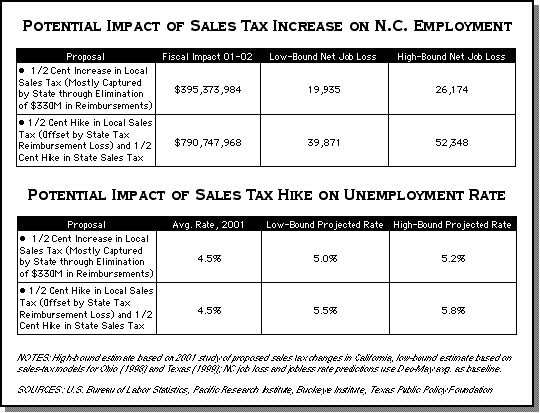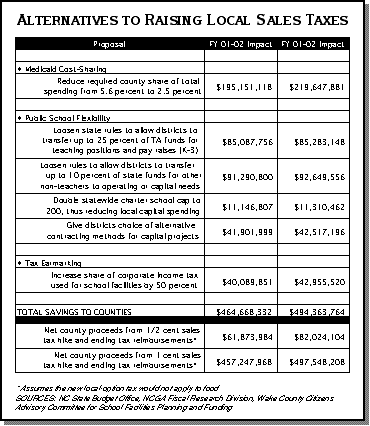July 11, 2001
Contrary to promises made during the 2000 election campaign and the current legislative session, including statements made only weeks ago, Gov. Mike Easley and key members of the General Assembly are now openly discussing a massive, broad-based tax increase to help fund the 2001-03 state budget. Among the options still being actively considered is a half-cent increase in the local-option sales tax, which would raise nearly $400 million in the coming fiscal year. Because supporters propose to end $333 million in tax reimbursements to local governments at the same time, this would essentially be a state tax increase. In addition, some lawmakers and lobbies have endorsed either a temporary or permanent half-cent hike in the state sales tax itself, raising the cost of the package to just under $800 million.1
Supporters are justifying this massive increase by citing three events that have transpired since the Senate and House finished their respective 2001-03 budgets. First, some are arguing that a spate of property tax increases across North Carolina prove that cities and counties need additional taxing authority. However, this argument would make more sense if the half-penny local sales tax hike weren’t accompanied with the loss of tax reimbursements. Such a deal will help local governments very little in the coming years. Moreover, it is not obvious why local taxpayers would be better served by hiking their sales taxes rather than their property taxes, particularly since the latter are deductible on their federal income taxes.
Most importantly, the state has other ways of assisting localities without raising the overall tax burden. For example, the state should implement more substantial savings in our Medicaid program, using the proceeds to reduce the counties’ share of Medicaid funding. Legislators should also loosen rules that prohibit school districts from building facilities more efficiently and from transferring state education funds to high-priority needs, as described in the table on the next page.
A Faltering Economy
The second justification supporters are using for a $400 million to $800 million sales tax hike is that North Carolina’s economy continues to slow, thus leading to lower-than-expected revenue growth. According to press reports, both the House and Senate budgets assumed a 5.3 percent growth rate in revenue in FY 2001-02, but the expected growth rate has now being reduced to 4 percent. That means House and Senate negotiators will have about $170 million less in revenue than contemplated, necessitating a change in either expenditures or revenues to keep the budget in balance.2
Obviously, a $170 million adjustment in revenue availability does not justify a tax increase that will cost North Carolinians many times that amount. What is particularly noteworthy is how tone-deaf state leaders appear to be about the state’s worsening economy. Rather than seeking ways to promote growth, such as cutting marginal tax rates or reducing regulations, these politicians seem concerned only about how the economy will affect the government’s income. “We’re deeply concerned in the Senate with the condition of the economy in North Carolina,” Senate President Pro Tem Marc Basnight said Monday.3 If so, why impose a massive tax hike on struggling North Carolina consumers and businesses?
Although no updated econometric model of North Carolina’s economy exists with which to project the impact of the proposed tax increase, models created in other states over the past three years can serve as the starting point for a rough estimate of the potential effects. In 1998, the Buckeye Institute in Ohio released a study that modeled the impact of a one-cent sales tax increase on retail sales, employment, and dynamic revenue gains.4 The following year, the Texas Public Policy Institute issued a similar study analyzing the relationship between proposed sales tax changes and employment.5 Finally, earlier this year the Pacific Research Institute in San Francisco studied the potential impact of sales tax reductions on job creation in California.6 These studies all found strikingly similar relationships; the equivalent of a one-cent increase in sales tax rates was associated with a 1.7 percent to 2 percent change in state employment.
Using these percentages as the low-bound and high-bound estimates of fiscal impact, and offsetting them with estimates of job creation from spending the resulting revenue7, we developed the projections contained in the table on the next page. A half-cent increase in North Carolina’s sales tax would generate about $395 million in gross revenues in FY 2001-02. This would likely result in a net loss of between 20,000 and 26,000 jobs. A one-cent sales tax increase would raise $791 million in gross revenues and likely result in a net loss of between 40,000 and 52,000 jobs. In each case, the actual increase in revenue availability would be lower than these figures, since increased unemployment would result in higher expenditures and lower income and sales tax collections.
Because these data derive from extrapolations from econometric models in other states, they may understate or overstate the magnitude of the effects. Even if a sales tax increase cost North Carolina only half the jobs estimated here, the result would still be painful for many North Carolina families and communities. There is good reason to believe that the impact might well be larger than that, however. For one thing, even a half-cent sales tax hike would make North Carolina’s rate (6.5 percent, and 7 percent in Mecklenburg) significantly higher than those imposed by counties in Virginia (4.5 percent) and South Carolina (6 to 7 percent) that border our state.8 North Carolina would suffer some cross-border sales as a result, reducing income and employment in North Carolina and cutting expected revenue collections.
The Bond Rating Bamboozle
Finally, some supporters of a sales tax increase have argued that North Carolina’s AAA bond rating will be at risk unless the state raises taxes to balance its budget and replenish its reserves. Unfortunately, this is a scare tactic, not a serious argument. There is no evidence that bond-rating agencies will downgrade North Carolina’s bonds unless lawmakers raise taxes. Moreover, the potential fiscal impact of such a downgrade simply does not justify a significant tax hike. The debt-service budget will be between $251 million and $276 million next year. Less than half of that is interest. A downgrade would affect interest rates on new bond issuances by between 10 and 22 basis points, based on recently published bond yields.9 Although undesirable, this change would cost taxpayers a few million dollars a year hardly a justification for a big tax hike to avoid it.
John Hood, President


Notes
- David Rice, “State chamber favors tax increase,” Winston-Salem Journal, July 3, 2001.
- Eric Dyer, “N.C. budget may depend on tax hike,” News & Record (Greensboro), July 10, 2001.
- Wade Rawlins, “Higher tax is possible,” The News & Observer (Raleigh), July 10, 2001.
- Ellen F. Foley, “STAMP: Showing How State Taxes Matter,” The Insider, Heritage Foundation, December 2000, p. 1.
- “The Texas State Tax Analysis Modeling Program: Methodology, Applications,” Texas Public Policy Foundation, San Antonio, TX, 1999.
- Eric Bauman, ” Tax Relief in California,” California Legislators’ Guide 2001, Pacific Research Institute, San Francisco, 2001, pp. 44-46. To estimate job creation, we divided the total state/local revenue generated by the average salary of an SPA state employee.
- “Sales and Use Tax Rates,” Sales Tax Institute, July 1, 2001, www.salestaxinstitute.com; and various SC county web sites.
- Composite bond yields for AAA and A muni bonds at various maturities, obtained July 10, 2001 from www.bondsonline.com.




